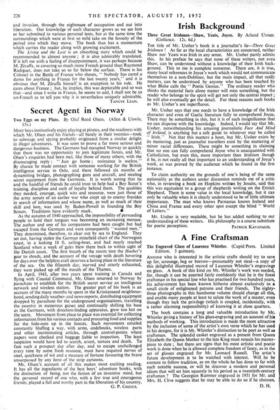Secret Agent in Norway
MOST boys instinctively enjoy playing at pirates, and the readiness with which Mr. Olsen and his friends—all barely in their twenties—took to sabotage and spying probably originated from a similar delight in illegal adventures. It was soon to prove a far more serious and dangerous business. The Germans had occupied Norway so quickly that there was no opportunity to join legitimate forces, and Mr. Olsen's enquiries had been met, like those of many others, with the discouraging reply : "Just go home ; resistance is useless." By chance he made contact with someone working for the British intelligence service in Oslo, and there followed six months of dynamiting bridges, photographing guns and aircraft, and stealing secret equipment from the Germans. It is worth noting that he and the handful of friends he could trust to help had a Boy Scout's training, discipline and oath of loyalty behind them. The qualities they needed, courage, quick wits and resource, were just those of the army scouts of an earlier war who crept up to enemy firesides in search of information and whose name, as well as much of their skill and lore, was used by Baden-Powell in founding the Boy Scouts. Traditions have evidently stuck.
As the autumn of 1940 approached, the impossibility of persuading people to hold their tongues was becoming an increasing menace. The author and one of his companions had been caught but had escaped from the Germans and were consequently "wanted men." They determined, therefore, to clear out by sea to England. They set out, having stolen the German minefield chart of the Norwegian coast, in a leaking 18 ft. sailing-boat, and had nearly reached Scotland when a week of gales blew them back to within sight of the Danish coast. The first breath of the storm tore the Haabet's gear to shreds, and the account of the voyage with death hovering for days over the helpless craft deserves a lasting place in the literature of the sea. On the fifteenth day, starved and utterly exhausted, they were picked up off the mouth of the Thames. In April, 1943, after two years spent training in Canada and flying with Coastal Command, Mr. Olsen returned to Norway by parachute to establish for the British secret service an intelligence network and wireless station. The greater part of his book is an account of the many months he spent in the Kristiansand neighbour- hood, sending daily weather- and news-reports, distributing equipment dropped by parachute for the underground organisations, travelling the country in numerous guises and continually shifting his base as the Germans, with direction-finding apparatus, grew too hot on the scent. Movement from place to place was essential for collecting information from his various contacts and procuring food and supplies for the hide-outs up in the forests. Such movements entailed constantly bluffing a way, with arms, codebooks, wireless parts and other incriminating articles, through control-points where papers were checked and baggage liable to inspection. The least suspicion would have led to search, arrest, torture and death. To face such a prospect day after day, and to escape unchallenged every time by some fresh resource, must have required nerves of steel, quickness of wit and a measure of fortune favouring the brave unsurpassed by any hero of the strip cartoons.
Mr. Olsen's account of all this makes most exciting reading. It has all the ingredients of the best boys' adventure books, with the distinction of being, not the fiction of an inventive mind, but the personal record of one who, with a few true and courageous friends, played a full and worthy part in the liberation of his country.
G. P. Gmoos.


























 Previous page
Previous page